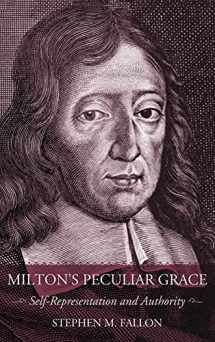
Milton's Peculiar Grace: Self-Representation and Authority
ISBN-13:
9780801445163
ISBN-10:
0801445167
Edition:
1
Author:
Stephen M. Fallon
Publication date:
2006
Publisher:
Cornell University Press
Format:
Hardcover
296 pages
FREE US shipping
Book details
ISBN-13:
9780801445163
ISBN-10:
0801445167
Edition:
1
Author:
Stephen M. Fallon
Publication date:
2006
Publisher:
Cornell University Press
Format:
Hardcover
296 pages
Summary
Milton's Peculiar Grace: Self-Representation and Authority (ISBN-13: 9780801445163 and ISBN-10: 0801445167), written by authors
Stephen M. Fallon, was published by Cornell University Press in 2006.
With an overall rating of 3.9 stars, it's a notable title among other
books. You can easily purchase or rent Milton's Peculiar Grace: Self-Representation and Authority (Hardcover) from BooksRun,
along with many other new and used
books
and textbooks.
And, if you're looking to sell your copy, our current buyback offer is $0.42.
Description
Despite writing about himself extensively and repeatedly, John Milton, the archetypal Puritan author, resolutely avoids the obligatory Augustinian narrative of sinfulness, conviction of sin, reception of the Word, regeneration of the spirit, and sanctification. The doctrine of fall, grace, and regeneration, so well illustrated in Paradise Lost, has no discernible effect on Milton's overt self-representations. Exploring this anomaly in his new book, Stephen M. Fallon contends that Milton, despite his deep engagement with theology, is not a religious writer.Why, Fallon asks, does Milton write about himself so compulsively? Why does he substitute, for the otherwise universal theological script, a story of precocious and continued virtue, even, it seems, a narrative of sinlessness? What pressures does this decision to reject the standard narrative exert on his work?In Milton's Peculiar Grace, Fallon argues that Milton writes about himself to gain immortality, secure authority for his arguments, and exert control over his readers' interpretations. He traces the return of the repressed narrative of fallenness in the author's unacknowledged and displaced self-representations, which in turn account for much of the power of the late poems. Fallon's book, based on close readings of Milton's "self-constructions" in prose and poetry throughout his career, provides a new view of Milton's life and his importance for contemporary literary theory-in particular for continued questions about authorial intention.To listen to a radio interview with Stephen Fallon discussing Milton's enduring significance, on the Australian Broadcasting Company's "Late Night Live," click here.


We would LOVE it if you could help us and other readers by reviewing the book
Book review

Congratulations! We have received your book review.
{user}
{createdAt}
by {truncated_author}


